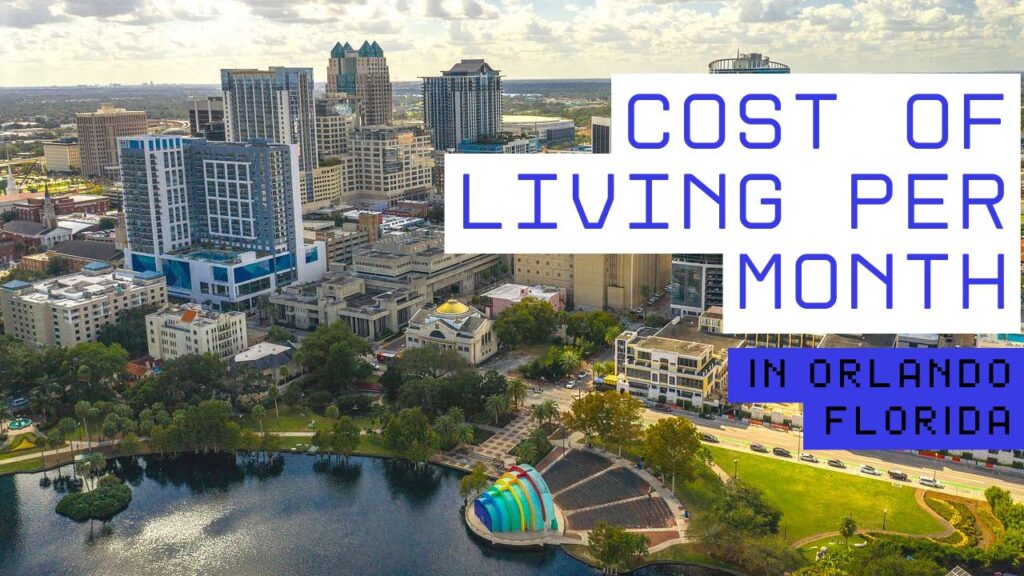The Cost of Living in Orlando, Florida: An In-Depth Guide
Orlando, Florida, is renowned for its theme parks, sunny climate, and active lifestyle. However, the city’s cost of living has seen significant increases in recent years. If you’re considering moving to Orlando or just curious about the monthly expenses, this comprehensive guide will provide a detailed breakdown of what you can expect financially.
Monthly Expenses Without Rent
Living in Orlando can be expensive. For a family of four, the estimated monthly expenses (excluding rent) hover around $4,154.60. This covers essentials like groceries, transportation, utilities, and leisure activities. A single person can expect monthly expenses of about $1,169.70 without rent.
A Global Perspective
Compared to international cities like Pune, India, living in Orlando is approximately 180% more expensive, not accounting for housing costs. When rent is considered, that figure escalates significantly.
Housing and Rent Costs
Housing is one of the largest expenses residents face in Orlando:
- One-bedroom apartment in the city center: Approximately $1,707.82 per month.
- One-bedroom apartment outside the center: About $1,561.71 per month.
- Three-bedroom apartment in the city center: Average of $2,918.18.
- Three-bedroom apartment outside the city center: Roughly $2,561.19.
When compared to Pune, rent in Orlando is staggering—519% higher. This is primarily due to the ongoing population growth and rising demand for real estate.
Food and Grocery Prices
Dining out in Orlando can quickly add up:
- Basic meal at a cheap restaurant: Around $20.
- Two-person dinner at a mid-range restaurant: Approximately $80.
- Fast-food combo meal: Roughly $11.
Grocery Costs
Grocery prices can also be steep:
- Milk (1 liter): $1.13
- Bread (500g): $3.70
- Rice (1kg): $5.33
- Eggs (12): $4.62
- Chicken (1kg): $11.38
- Beef (1kg): $16.03
- Cheese (1kg): $11.25
Fruits and vegetables are no exception:
- Apples (1kg): $6.21
- Tomatoes (1kg): $4.03
- Potatoes (1kg): $2.70
- Lettuce (1 head): $2.62
Families typically find grocery shopping can take a sizable chunk of their budget.
Utilities and Internet
Utility costs in Orlando are fairly standard. Monthly expenses for electricity, heating, cooling, water, and garbage collection average around $202.42. Internet service is notably higher, with a typical high-speed connection costing about $79.80 per month.
Mobile phone plans rank among the most expensive globally, with an average cost of $69.44 per month for a basic plan that includes calls and at least 10GB of data.
Transportation and Gas
While public transportation exists in Orlando, most residents rely on personal vehicles. Here’s a quick look at transportation costs:
- One-way bus fare: $2.00
- Monthly transit pass: $50
- Taxi base fare: $2.90
- Taxi per kilometer: $1.90
- Gasoline (1 liter): $0.87
Owning a car can be costly, with a new Toyota Corolla priced above $25,000 and monthly car-related expenses (insurance and upkeep) easily reaching $400.
Child Care and Education
Childcare costs can be significant for those raising kids:
- Private preschool (full-day): $1,175 per month
- Primary international school: Approximately $9,833 per year
These prices don’t account for books, uniforms, or extracurricular activities, which can pose additional financial burdens.
Recreation and Lifestyle
Orlando offers a vibrant entertainment scene, but it comes with its own costs:
- Fitness club membership: $37.83 per month
- Tennis court rental (1 hour): $6.12
- Cinema ticket: $15.00
Alcohol and tobacco are heavily taxed:
- Domestic beer (0.5L bottle): $2.26
- Imported beer (0.33L): $2.71
- Bottle of wine: $15.00
- Marlboro cigarettes (20-pack): $8.50
While many outdoor parks are free to enjoy, budget-conscious individuals will want to plan for the costs of paid activities.
Clothing and Footwear
Fashion expenses in Orlando align with national pricing:
- Jeans (Levi’s or similar): $45.25
- Summer dress (chain store): $35.71
- Running shoes (Nike): $83.79
- Men’s business shoes: $110.62
Frequent shoppers should prepare for higher clothing costs than in many international cities.
Income vs. Cost of Living
The average monthly after-tax salary in Orlando is around $4,336.29. This amount barely covers living expenses for an individual. Families, particularly those with single incomes, often face budgetary strains due to high costs in housing, childcare, and groceries.
The minimum wage in Florida is on the rise, nearing $14/hour in 2025, with aspirations of reaching $15/hour by 2026. However, many employees still earn less than this average.
Conclusion: Is Orlando Affordable?
Orlando is a beautiful, energetic city filled with opportunities, but the increasing cost of living poses challenges. Rising expenses in rent, groceries, utilities, and childcare can strain budgets, making budgeting essential for prospective residents.
For those with stable, well-paying jobs, life in Orlando can be fulfilling. Conversely, low-income workers, retirees, and families may find the financial landscape a significant burden. It’s crucial to assess your financial situation carefully before making the move.
For more insights on living costs in different cities, check out Numbeo and Expatistan, which provide valuable information on living expenses worldwide.


